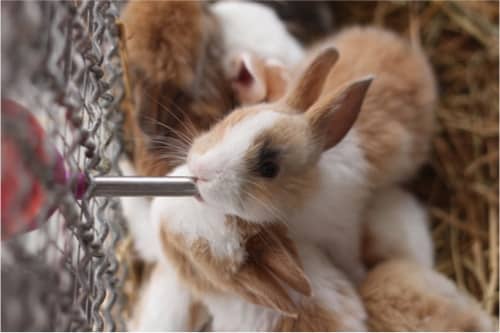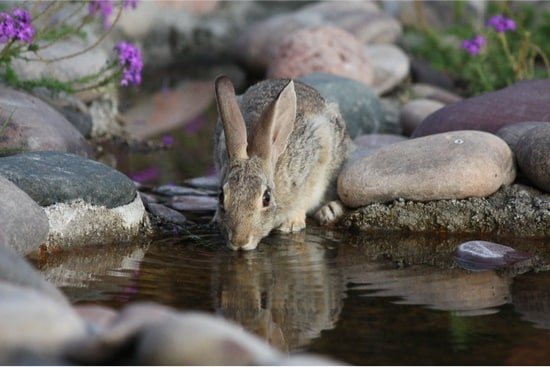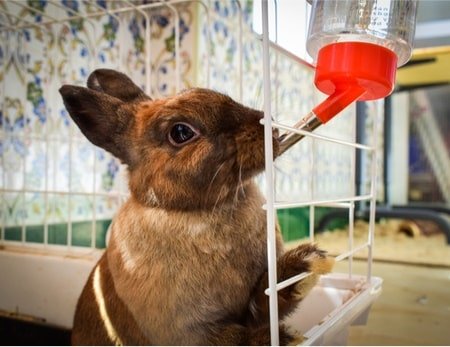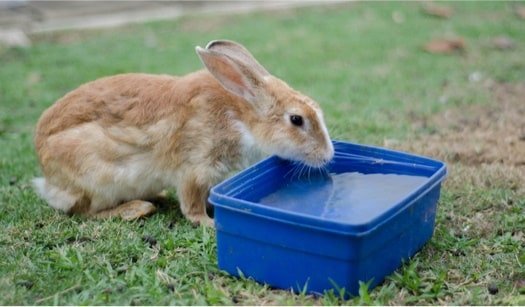A rabbit that stops eating or drinking is in immediate danger. Hydration, in particular, is pivotal to your pet’s survival. Without regular access to fresh drinking water, her health will suffer.
Going for 24 hours without drinking water will be fatal for most rabbits. Not drinking can lead to complete organ failure. Take action at the first warning signs of dehydration, especially during the summer.
If your rabbit is reluctant to drink, find out why. Observe closely and she’ll likely reveal her issue. It may be a problem with her bowl or bottle. She may not like the smell of the water. It could even be a dental problem. Whatever the explanation, seek a resolution. Rabbits need water to survive.
Do Rabbits Drink Water?
Rabbits do drink water. Regardless of whether the animal is wild or domesticated, water is essential. A rabbit that does not drink daily places her life in jeopardy.
Like all living things, water makes up a large percentage of a rabbit’s body. Also, drinking enough water is crucial for several organic functions:
- Water keeps your rabbit’s blood flowing at an appropriate rate and thickness. This ensures that your rabbit’s organs continue to function optimally.
- Water helps your rabbit’s digestive tract process and move food, eventually leading to elimination.
- Water flushes excessive calcium from your rabbit’s blood. This prevents urinary incontinence and related health issues, including bladder stones.
If a rabbit does not drink water, dehydration is an obvious worry. Other issues will also arise, though. Your rabbit will struggle to urinate and defecate, which will cause intestinal blockages. This rapidly becomes a fatal condition.
Thankfully, rabbits are smart enough to know that hydration is essential. Wild rabbits build warrens close to fresh water supplies. If your pet rabbit is not drinking, there will be a reason why.
How Much Water Do Rabbits Drink Daily?
As is so often the case, answering this question involves a range of variables:
- How big is your rabbit? Larger breeds require more water to stay healthy.
- How hot is the temperature? Rabbits drink more in the summer and less in the winter.
- How old is your rabbit? Young, growing rabbits need more water than older rabbits.
- How energetic is your rabbit? The more your pet runs around and exercises, the greater her need to rehydrate will be. Lazy rabbits will work up less of a thirst.
- What is your rabbit’s diet? If your rabbit sustains herself exclusively on dry hay and pellets, she’ll need more water. If your rabbit enjoys leafy greens, she’ll obtain some dietary hydration.
A typical, healthy, and happy rabbit should drink around 10% of her body weight in water. If your rabbit weighs 4 lbs., she should drink a minimum of 180ml of water each day.
One typical cup of water a day is more than enough to keep rabbits healthy. Don’t just pour this once. Your rabbit’s water supply should be regularly topped up and changed for her safety.
You’ll also notice that all water bottles and bowls are larger in size than 180ml. This is deliberate. As rabbits prefer to live in pairs, vessels cater for multiple pets. It also reduces the risk of an empty bowl or bottle for a prolonged period.
How Long Can Rabbits Last Without Water?
A rabbit cannot go longer than 24 hours without drinking. If the weather is particularly hot, this period is even shorter. It cannot be stressed enough how important water is for your pet. Your pet will die without it.
There is a big difference between ‘no water’ and ‘some water.’ This 24-hour period relates to a rabbit not drinking at all. A pet drinking a little, but not enough, is not quite as immediately perilous.
This situation must be looked into. A rabbit will become dehydrated if she doesn’t drink enough water. If your pet is reluctant to drink, learn why and take action. She will soon become unwell.
How Long Can Rabbits Go Without Water in the Cold?
In the winter months, you will notice that your rabbit drinks less. This is perfectly natural, and nothing to worry about. As long as she is still drinking at least some water, your pet is safe.
The 24-hour rule is still in full effect during winter, though. Rabbits still need water when it’s cold outside. Your pet will grow dehydrated without it. Her thick fur coat keeps her warm, but she still needs to drink.
Your pet’s body still needs water to function. A rabbit’s blood and internal organs do not monitor the ambient temperature. Your pet must drink in order to remain healthy.

How Can I Keep My Rabbit’s Water from Freezing in the Winter?
One of the biggest challenges with rabbit hydration during winter is frozen water. Rabbits can cope well with sub-zero temperatures. The water in her bottle or bowl may freeze over, though.
Bottles are more likely to freeze in winter. This can lead to the ice expanding and cracking the vessel. If your rabbit uses a water bottle, you should get a thermal cover for the winter months.
It’s advisable to also use a bowl or dish during the winter as a safety precaution. Use a vessel with deep sides. This means the contents are less likely to freeze and turn to ice.
Wherever possible, prevent the water from becoming too cold in general. Many rabbits do not enjoy ice-cold water. Your pet will prefer something a little more tepid.
Why Do Rabbits Not Drink Water?
There are many reasons why a rabbit would refuse to drink. These range from the psychological to the medical. They are as follows:
- The water tastes or smells funny. Rabbits are fussy animals. If something tastes it smells different about her water, she’ll refuse to drink. Empty the bowl or bottle and refill it.
- The water is the wrong temperature. Rabbits like water that matches the ambient temperature. If her water is too cold or too hot, your pet will likely reject it.
- Your rabbit has a toothache. Rabbit teeth are sensitive. If your pet is experiencing dental pain, eating and drinking will aggravate it. This needs to be resolved by a professional.
- The water vessel is unclean. You’ll need to regularly wash and clean your pet’s water bowl or bottle. If the vessel is dirty, your rabbit will not trust the contents.
- Your rabbit feels hydrated from her food. Have you increased your pet’s leafy green intake? If so, she may feel that she’s already hydrated. Keep an eye on this, though. Food alone does not provide enough water.
- Your rabbit has an alternative water source. It’s always possible that your rabbit is drinking elsewhere. She may have found a leaky tap or pipe in your home.
- Your rabbit is sick. Vast arrays of illnesses cause rabbits to reject food and water.
A rabbit refusing to drink is not typical behavior. Something will be wrong. Even if she is just being fussy, you have to take it seriously. Rabbits can be stubborn to the point of endangering themselves.

How to Tell if a Rabbit is Dehydrated
The most immediate and concerning repercussion of a rabbit not drinking water is dehydration. It’s crucial that you know the warning signs of this condition. Symptoms include:
- Tight skin. Gently pinch your rabbit’s fur around the skin of her neck. If it doesn’t immediately snap back into position, as though made of elastic, dehydration is likely.
- Foul-smelling urine. The ammonia scent becomes much more pronounced if she’s dehydrated. It will also be darker in color.
- Fever. If your rabbit’s body temperature is above 103 degrees Fahrenheit, she is in danger.
- Lethargy and disorientation. Dehydration seriously affects a rabbit’s energy levels. Your pet may also seem uncharacteristically clumsy and uncoordinated.
- Loss of appetite. If your rabbit isn’t drinking, her body will not be functioning properly. This will leave her reluctant to eat as well. This adds an extra layer of danger to her condition.
Dehydration can be a killer for rabbits. Young, old or otherwise vulnerable pets are most at risk. If you suspect that your pet is dehydrated, she needs to be rehydrated urgently.
How to Rehydrate a Rabbit
Rehydrating your rabbit is critical, so it’s advisable to seek the help from a vet. Don’t just provide a large bowl of water and assume that your work is done.
Even if your pet laps this water up, it won’t resolve the problem. Rehydration needs to be a slow and steady process. The most effective solutions are syringe feeding and intravenous fluids.
If you want to try syringe feeding, pick one up from a pet store. Fill the syringe with water and place it in the corner of your rabbit’s mouth. Release water in small, controlled bursts. Let your pet swallow and rest between drinks.
If your rabbit remains reluctant to drink or cannot swallow, take her to the vet. Your pet will need IV fluids. By this stage, the situation will be urgent, so ensure that she’ll be seen immediately.

How to Get a Rabbit to Drink Water
If your rabbit is reluctant to drink water, your first priority is changing this. Initially, your biggest concern is getting some fluids into your pet. Techniques to try include:
- Switch from a water bowl to a bottle, or vice versa
- Thoroughly clean all water vessels so that they smell neutral
- If your rabbit will not drink tap water, purify it or purchase bottled water
- Make your rabbit’s water more appealing with tasty additions
The latter is arguably the most failsafe method. If your rabbit refuses to drink, mix small amounts of unsweetened fruit juice into her water. She’ll soon start to show an interest again. Apple or carrot juice typically works well. As soon as she starts drinking again, stop providing the additional juice.
If you’re not careful, you’ll end up back at square one. Your rabbit will stop drinking water again, holding out for more juice. Also, ensure that you know the difference between sugar-free and unsweetened juice.
The latter will typically only contain naturally-occurring sugars. These are rabbit-safe in small doses. A juice that is marketed as sugar-free may contain toxic artificial sweeteners.
Is Tap Water Safe for Rabbits?
This depends on where you live. Tap water is usually safe for consumption by humans and animals alike. The CDC considers the tap water in the USA to among the safest in the world.
This does not mean that your rabbit will accept tap water, though. Your pet may smell treatment chemicals in the water. Alternatively, she might be fussy and find that the taste is not to her liking.
If this is the case, invest in a water purifier. This may change your pet’s reluctance. If not, try bottled water. It’s expensive, but if it gets your rabbit drinking, it’s definitely worth it.
Should a Rabbit be Given Water in a Bottle or Bowl?
There are pros and cons to both of these approaches. Take a look at the table below for a summary:
| Water Bowl – Advantages | Disadvantages | Water Bottle – Advantages | Disadvantages |
|---|---|---|---|
| Your rabbit will always be able to see and access her water. | Many rabbits treat water bowls as toys. Your pet may toss hers around. | If sipping from a bottle, your rabbit will only drink as much water as she needs. | Your rabbit may chew at the end of a water bottle. This could damage or hurt her teeth. |
| Your rabbit can drink as much as she wants, at a speed that suits her. | The bowl will need to be cleaned regularly. Bacteria and mold may grow in it otherwise. | Most bottles release water when your rabbit licks the tip. This reduces the risk of spillage. | Bottle release water slowly, one drop at a time. This may frustrate a thirsty rabbit. |
| A bowl appeals to your rabbit’s instincts. In the wild, she would lap water from a river or stream. | Your rabbit may drop her hay or food inside the bowl. This ‘contaminates’ the water in her eyes. | The water supply will last longer if multiple pets share a hutch. One rabbit cannot drink all the water, or knock over the bowl. | Water bottles need to be fastened to a cage or hutch. This means your rabbit will need to reach to access it. |
| Bowls are better for your rabbit’s neck. She will not have to contort herself to reach her water. | If you have two or more rabbits, they’ll quickly empty the bowl between them. You’ll need to top it up regularly. | The water is less likely to freeze in winter, with the right precautions. Invest in an insulated cover for the bottle. | Water bottles are a pain to clean. You’ll need to do so though, or risk bacterial growth. |
Try both vessels, and see which one your pet appears to prefer. Most rabbits have a preference, one way or another. Of course, there is also nothing wrong with offering both options.
Why Does My Rabbit Keep Tipping Over Her Water Bowl?
Many rabbits treat water bowls as toys. Your pet may be among this number. This becomes especially likely if your rabbit is bored. A rabbit that lacks stimulation quickly becomes destructive.
Your rabbit may be concerned that her water is contaminated. Foreign objects can cause this worry. If your rabbit drops food in her water, she’ll tip the bowl over. Strange smells will have the same impact. She no longer trusts the water source.
It’s also possible that your pet is a rare rabbit that enjoys water play. She may be tipping over her bowl so she can splash around. This is the exception more than the rule, though.
The easiest way to prevent the bowl from tipping up is by using a heavier vessel. Even a strong and determined rabbit will struggle to flip a full, ceramic bowl. Just be careful. Your rabbit may still nudge her bowl off an elevated shelf.
If she does so, the bowl may crack or even break. This creates a health hazard. Your pet may cut her feet on the shards. A rabbit may also hurt her teeth attempting to chew on a ceramic bowl. Here is some information on things that rabbits shouldn’t chew.
If your rabbit is determined not to use her bowl properly, switch to a bottle. You may need to teach your pet how to use this, though.
How to Teach a Rabbit to Use a Water Bottle
Your rabbit may never have seen a water bottle before. It depends on her earliest experiences. A rabbit born in a pet store will be familiar with bottles. A breeder may have used bowls, though.
To teach your rabbit how to drink from a bottle, tempt her to try it. Dab something appealing on the spout. Rabbits love sweet tastes, so try some sugar-free jam (without xylitol). This will encourage your pet to lick the spout of the bottle.
Your rabbit will quickly learn that this produces water. Keep bowls in her hutch until your rabbit has mastered using the bottle. Don’t provide treats for too long, though. Your rabbit will grow used this, and expect it all the time.
Encourage your pet to drink regularly, and pay attention if she stops. No rabbit will willingly go thirsty. There will be an explanation for this, and it needs to be found.
Drinking water is even more critical than eating food. If your rabbit goes longer than 24 hours without drinking, then her health is in peril. Never let things reach this point.

